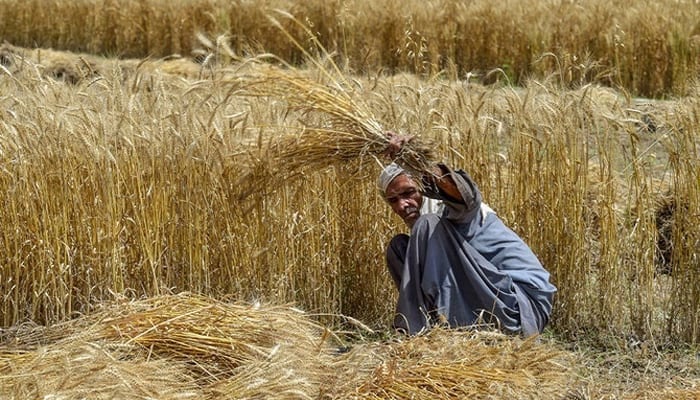Tags
Farmers endure unbearable losses on multiple crop failures, says PKI
By Munawar Hasan

LAHORE: Farmers have been enduring unbearable losses on multiple crop failures and price crash of commodities, unfolding an agricultural emergency in the country, said the Pakistan Kissan Ittehad on Wednesday.
The agricultural sector is teetering on the brink of collapse, with growth falling by a staggering 5.84 per cent in just one year and major crop production shrinking over 13 per cent, including a devastating 8.9 per cent drop in wheat crop. Per the grower body, farmers have borne “catastrophic compound losses of Rs2,200 billion in wheat alone between May 2024 and May 2025”.
Similarly, cotton production has been halved, triggering an unprecedented 178 per cent surge in import bills to $4.45 billion, exhausting burden on foreign reserves and undermining economic stability. Maize crop poses not different story; maize growers have faced 15.4 per cent plunge in maize, said President of the PKI Khalid Khokhar while addressing a press conference.
He continued to say that despite a 9.0 per cent expansion in national GDP, agriculture’s rapidly shrinking contribution exposes systemic failures that threaten to unravel national food security, devastate rural livelihoods, and cripple economic resilience.
Pakistan’s agricultural export performance for 2024-25 has deteriorated alarmingly, exposing deep structural vulnerabilities related to agriculture and threatening the country’s already fragile economic stability. Key agri-commodities have recorded sharp YoY declines, with maize exports collapsing by a staggering 86 per cent, plunging to just $58.9 million. Rice, traditionally a top foreign exchange earner, has fallen by 15 per cent to $ 3.3 billion, while onion exports have dropped by 48 per cent, mangoes by 16 per cent, and potatoes by nearly 4.0 per cent.
The Punjab government’s proposed Rs129.8 billion agriculture budget for FY2025-26 — a modest 10.75 per cent increase over last year — has drawn sharp criticism from stakeholders who say it grossly underestimates the sector’s deepening crisis.
The PKI warned that the continued neglect of agriculture, marked by collapsing crop yields and dwindling investment, threatens Pakistan’s trade balance, foreign reserves and food security. It termed the Rs12 billion increase “a token gesture” in response to a multi-trillion-rupee crisis.
Despite a sharp downturn, the government’s proposal to tax agricultural income — using the same slabs applied to corporates — has raised fears of further burdening farmers already hit by climatic shocks, rising input costs, and water scarcity. If implemented, the measure could worsen rural poverty and drive mass migration, protests, and unrest.
Fertiliser usage and tractor sales — key indicators of farm investment — have plummeted, signalling a possible collapse in Kharif crop yields, especially cotton. If the trend continues into the rabi season, wheat sowing may decline sharply, pushing the country closer to a food emergency.
In FY25, the agriculture sector contracted by 5.84 per cent. Major crop output fell 13.49 per cent year-on-year. Cotton production stood at just 5.55 million bales — 50 per cent below target. Wheat production dropped 8.91 per cent to 28.98 million tonnes, an estimated Rs250 billion loss in potential value. Maize fell by 15.4 per cent, while prices crashed by Rs1,200 per 40kg last month. Sugarcane output declined to 84.24 million tonnes.
Pakistan’s cotton import bill is projected to soar 178 per cent to $4.45 billion this fiscal year, reflecting deep structural inefficiencies.
To address the crisis, the PKI proposed creating an Agri Commodities Price Commission to ensure a 25 per cent return on investment and fair pricing. Other recommendations include establishing an Agricultural Export Authority, abolishing GST on seed cotton, tractors, and implements, and fixing a uniform Rs10/unit electricity tariff for irrigation tubewells.
https://www.thenews.com.pk/print/1322621-farmers-endure-unbearable-losses-on-multiple-crop-failures-says-pkiPublished Date: June 19, 2025






